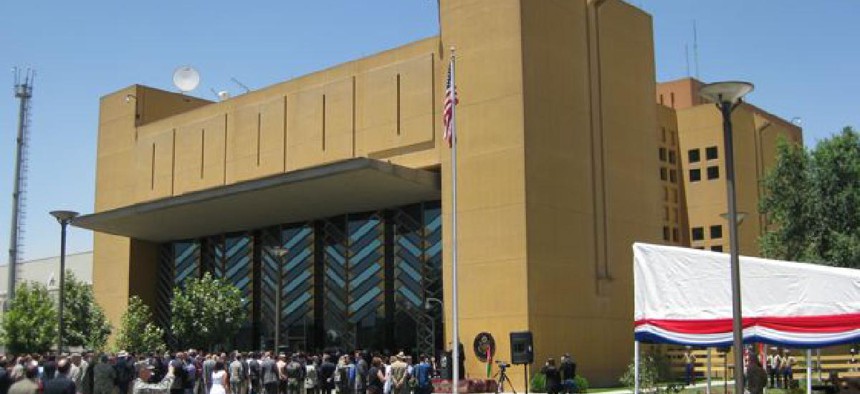
U.S Embassy Kabul Afghanistan photo
State Department budget request only slightly higher than 2012
Increase is especially small considering the agency's growing responsibilities.
President Obama on Monday requested $43.4 billion for the core budget of the State Department and U.S. Agency for International Development for fiscal year 2013, with an additional $8.2 billion in a separate “overseas contingencies operations” account for civilian-led missions and programs in frontline states such as Iraq, Afghanistan, and Pakistan.
The total $51.6 billion in discretionary funding is an increase of only 1.6 percent -- or $800 million -- over the 2012 enacted level, including the costs of the Overseas Contingency Operations resources.
The increase is especially slight considering the State Department’s growing responsibilities in frontline states now that U.S. troops have left Iraq and are slated to draw down in Afghanistan. As it did for the first time last year, the State Department requested some of its money for operations in those countries within OCO, a separate wartime funds account in conjunction with the Defense Department.
Obama requested $4.8 billion for the civilian-led missions in Iraq. Of this, about $1.8 billion would go toward funding police training and military-assistance programs transitioned from the Defense Department. Another $2.7 billion in operations funding would largely support the embassy -- which has swelled to about 16,000 diplomats and contractors in Baghdad -- and three consulates. All told, State's Iraq funds are approximately 10 percent less than the current fiscal-year level. For its part, the Defense Department requested only $2.9 billion for Iraq-related costs in 2013.
The State Department requested $4.6 billion for projects in Afghanistan, where Obama has pledged to bring the remaining “surge” troops back home no later than September. Of that, $2.5 billion is slated for counterterrorism-related programs, reconciliation and reintegration efforts, and other assistance. An additional $2.1 billion supports the expansion of the diplomatic and interagency presence there, and public-diplomacy programs. With about 68,000 U.S. troops still expected to be in Afghanistan next fall, the Pentagon requested $85.6 billion for its operations there in 2013.







